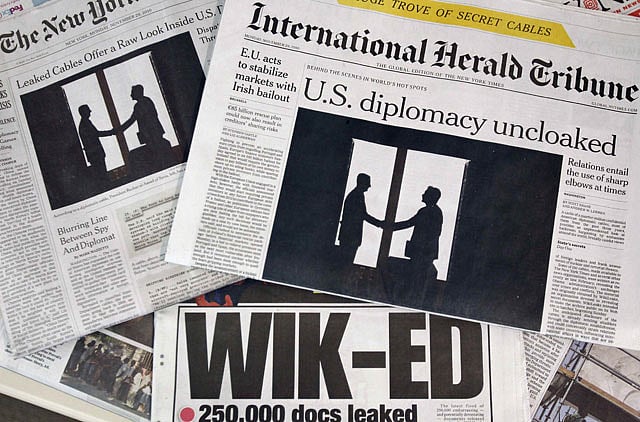Why WikiLeaks? Or, why these leaked documents and not other ones, and why these documents now? The answers may seem obvious. Because we can. Because they're there. Because we want to. Because it is in the public interest, or at least of interest to the public, even though that's not the same thing.
All these are parts of the larger answer. But they aren't the full explanation. To say these leaks can only be understood in the context of technology that enables such masses of material to be passed around the world on a memory stick is, of course, true.
To say they are a product of an online culture in which openness and transparency are articles of faith (though not in China) and that it intersects with an older media culture which believes that what can be published should be published (though not in China) is true too. But this is about politics and history too.
Unjust wars always beget a fervour among opponents for disclosure. Older Americans make the comparison with the battle between former president Richard Nixon and the New York Times to publish the Pentagon Papers on the Vietnam war.
But the US Defence Secretary, Robert Gates, delved back much further recently. "How can a government go on, publishing all of their negotiations with foreign nations, I know not," he quoted. "To me it appears as dangerous and pernicious as it is novel."
Thus spake former president John Adams more than 200 years ago.
But the long contest between secrecy and openness is not uniquely American. Britain boasts a long tradition of mainly left-wing radicals (though some right-wing ones too) who believe British foreign policy is a conspiracy against the public interest, and mainly conservative defenders of the status quo (and a few radicals) who insist that it is the very opposite.
Conspiracy theories
Few people nowadays recall much about David Urquhart, the 19th-century MP who became convinced the British governing class in general, and the long serving foreign secretary Lord Palmerston, in particular, were in the pay of Russia.
Urquhart was not merely opposed to what British diplomats did. He also believed their betrayals could be found and exposed in the messages and documents they wrote to one another. He believed "the basis of diplomacy is secrecy". His solution to diplomacy was openness.
In the 1840s, he launched the Association for the Study of National and International Affairs, which he subtitled Committee for the Investigation of Diplomatic Documents. Urquhart would have been in hog heaven today. By far the most important upsurge of anxiety about the making of foreign policy and in favour of greater openness came around just after the First World War.
British journalist and politician E.D. Morel is as little known today as Urquhart. But Morel's Union of Democratic Control (UDC) picked up where Urquhart had left off and became far more influential. Its great enemy was the "secret diplomacy" that it believed had caused the catastrophic war.
It wanted all treaties and foreign policy undertakings to require parliamentary sanctions. It called for a council of nations whose dealings would all take place in public. It supported Woodrow Wilson's Fourteen Points, the first of which demanded "open covenants of peace, openly arrived at".
Like Urquhart, the UDC was convinced that proof of the treachery and crimes of secret diplomacy would be found in the official documents, though without revealing the killer proof of which the UDC dreamed.
Britain was one of several nations in which the First World War triggered a public reaction against secret diplomacy for causing the conflict and in favour of a new international order based on law, treaty, openness, democracy and, above all, peace.
The broad parallels with today are very strong. A war that was widely opposed, a traumatic generational experience, a collective belief that the people were deceived, a conviction that public inquiries and the opening up of documents would reveal the incriminating evidence, and a desire to change the rules, above all by making them more democratically accountable, to avoid the same thing happening again. All these were present in the generation that lived through the First World War. All are present today in the generation that has lived through the Iraq and Afghan conflicts.
That does not mean every aspect of the openness and accountability agenda is right or realistic, now or in the 1920s. Some things have to be secret. And openness can be a midwife of secrecy as well as its scourge.
British historian A.J.P. Taylor once wrote that if all secret cables were published each day in the papers, the world would still go on. That seems to be the sensible verdict on the WikiLeaks material, with a few exceptions. Yet government (and journalism — and life) involves keeping secrets as well as being open. There is virtue in both. What matters is whether the secrets are necessary and honourable.
Why WikiLeaks? Partly because we can. But, now as in the past, it is about a needless war and the governments that chose to fight it.
- Martin Kettle is an associate editor of the Guardian.
Sign up for the Daily Briefing
Get the latest news and updates straight to your inbox
Network Links
GN StoreDownload our app
© Al Nisr Publishing LLC 2026. All rights reserved.
